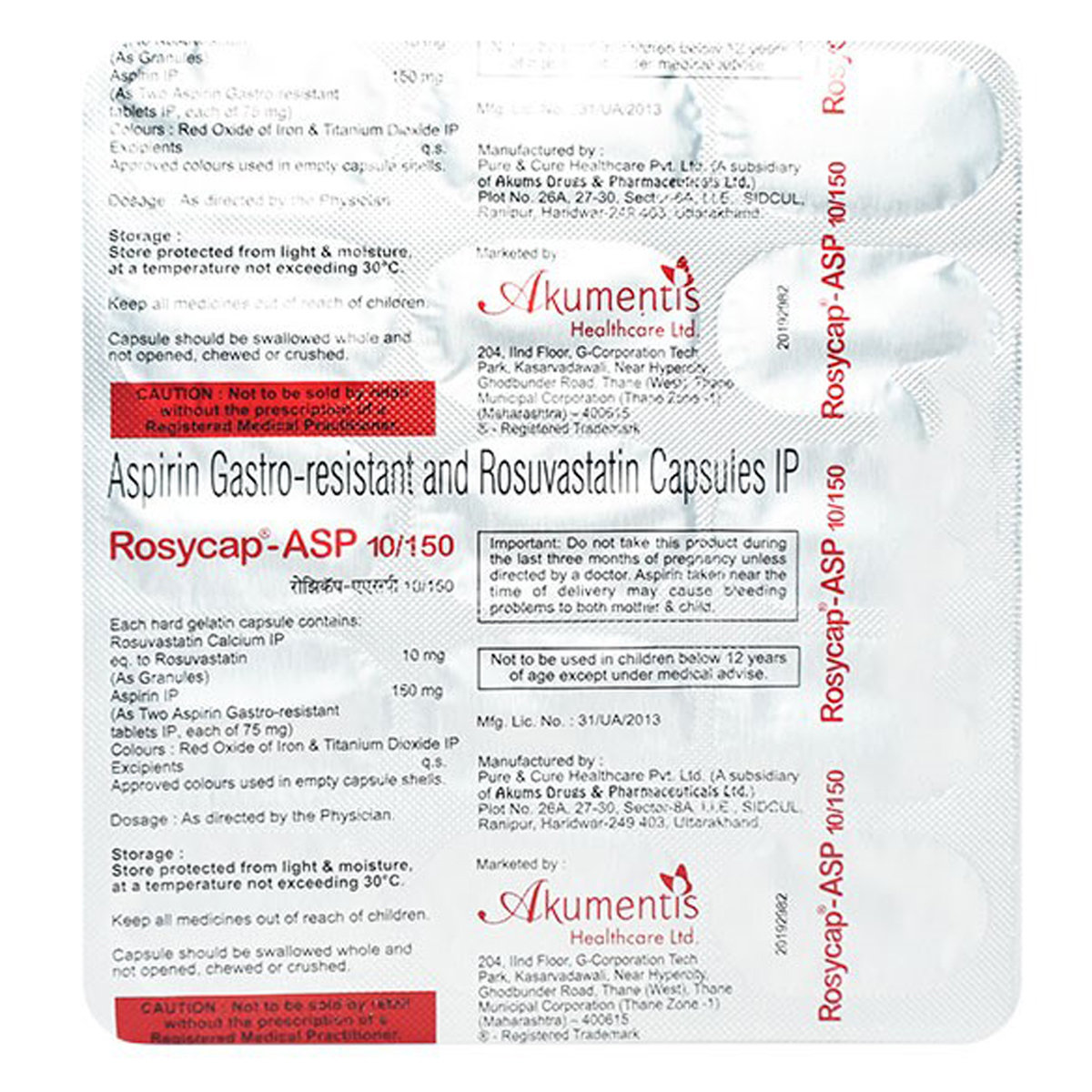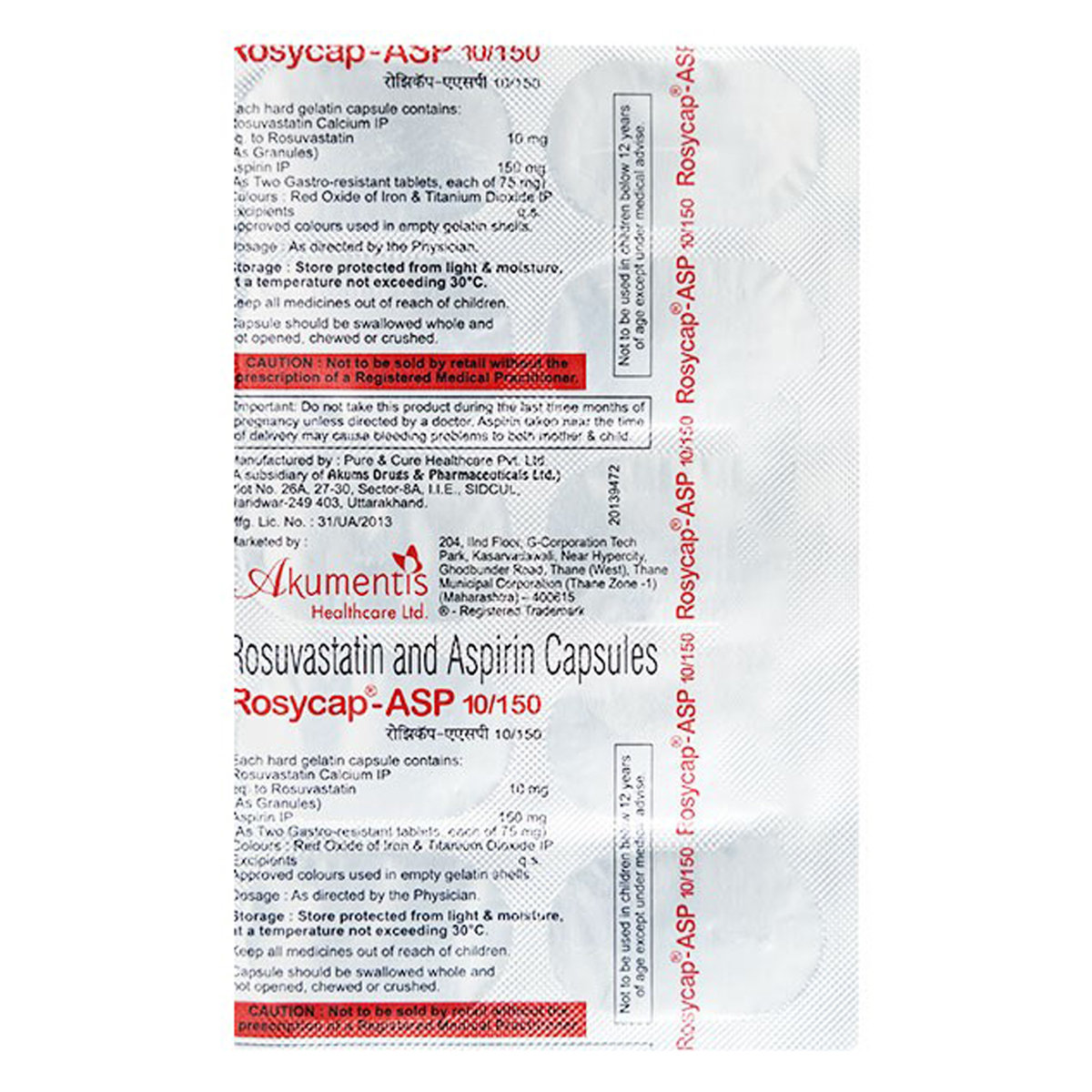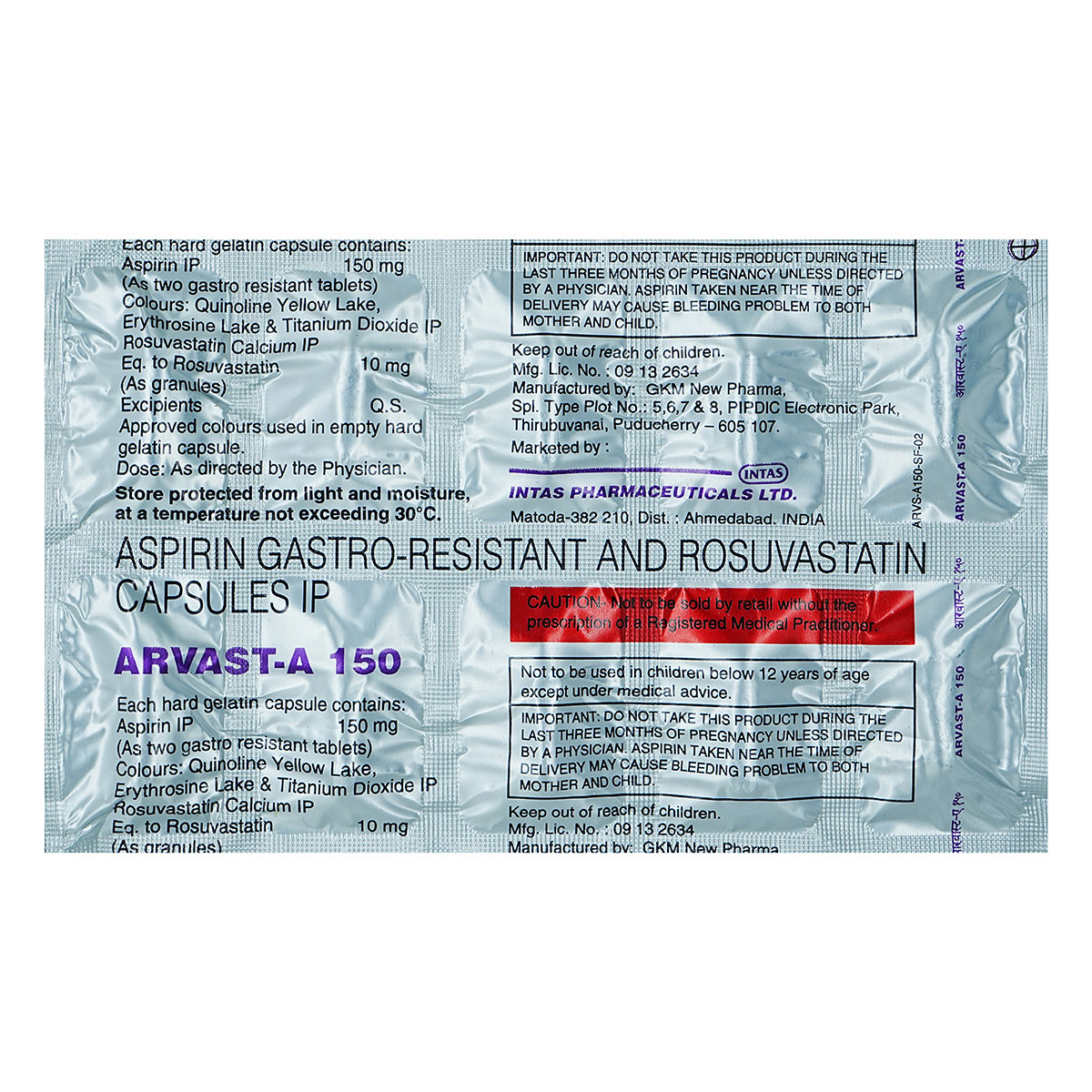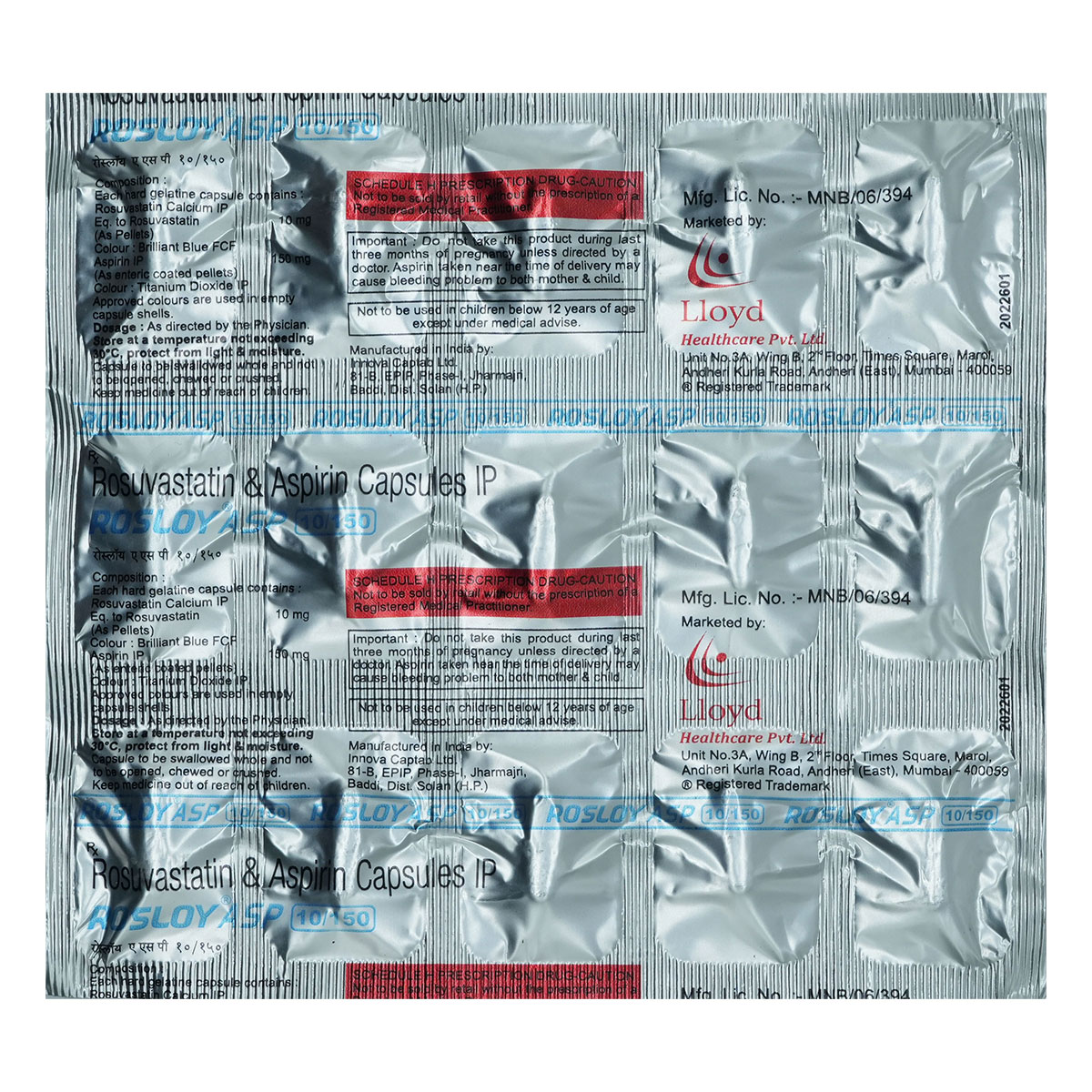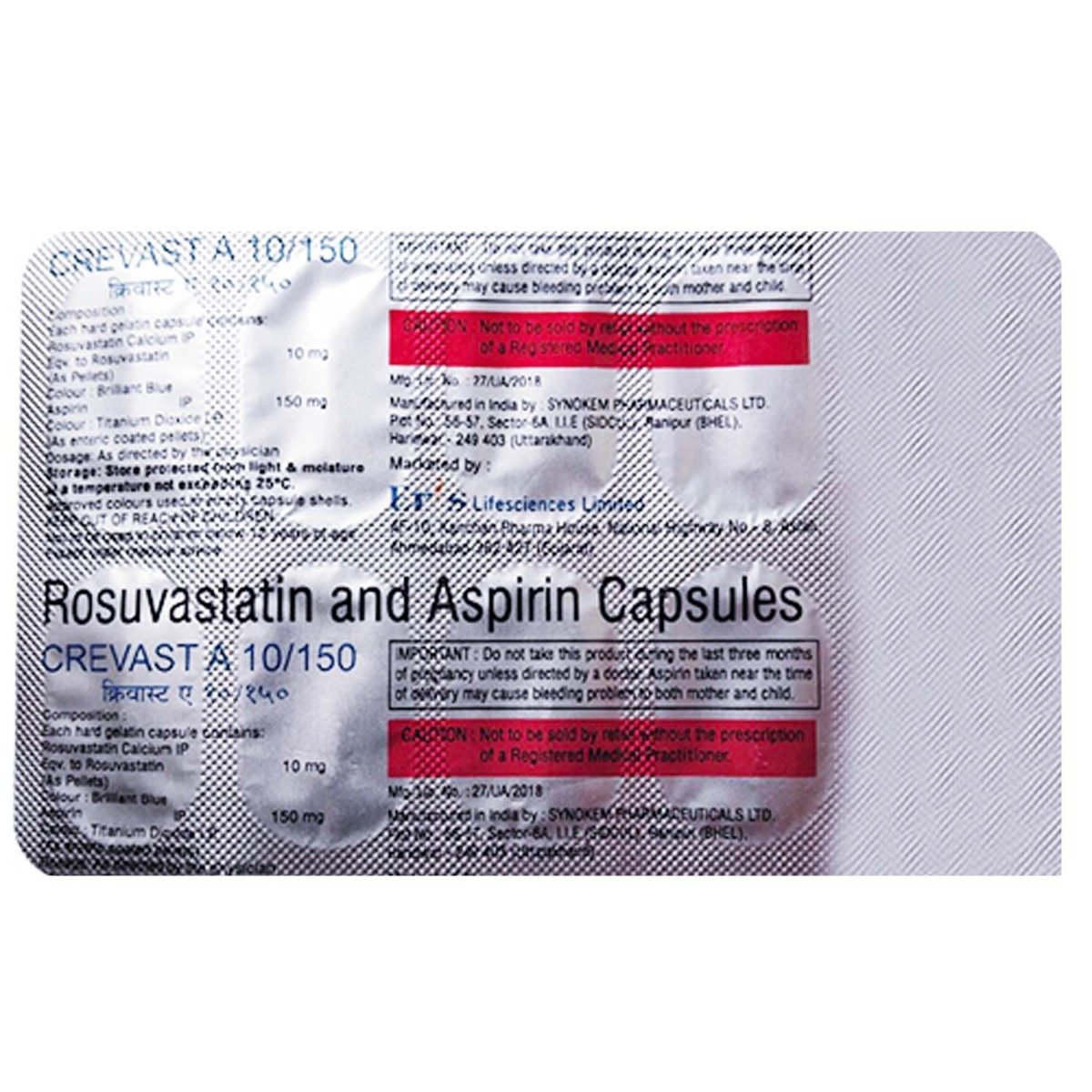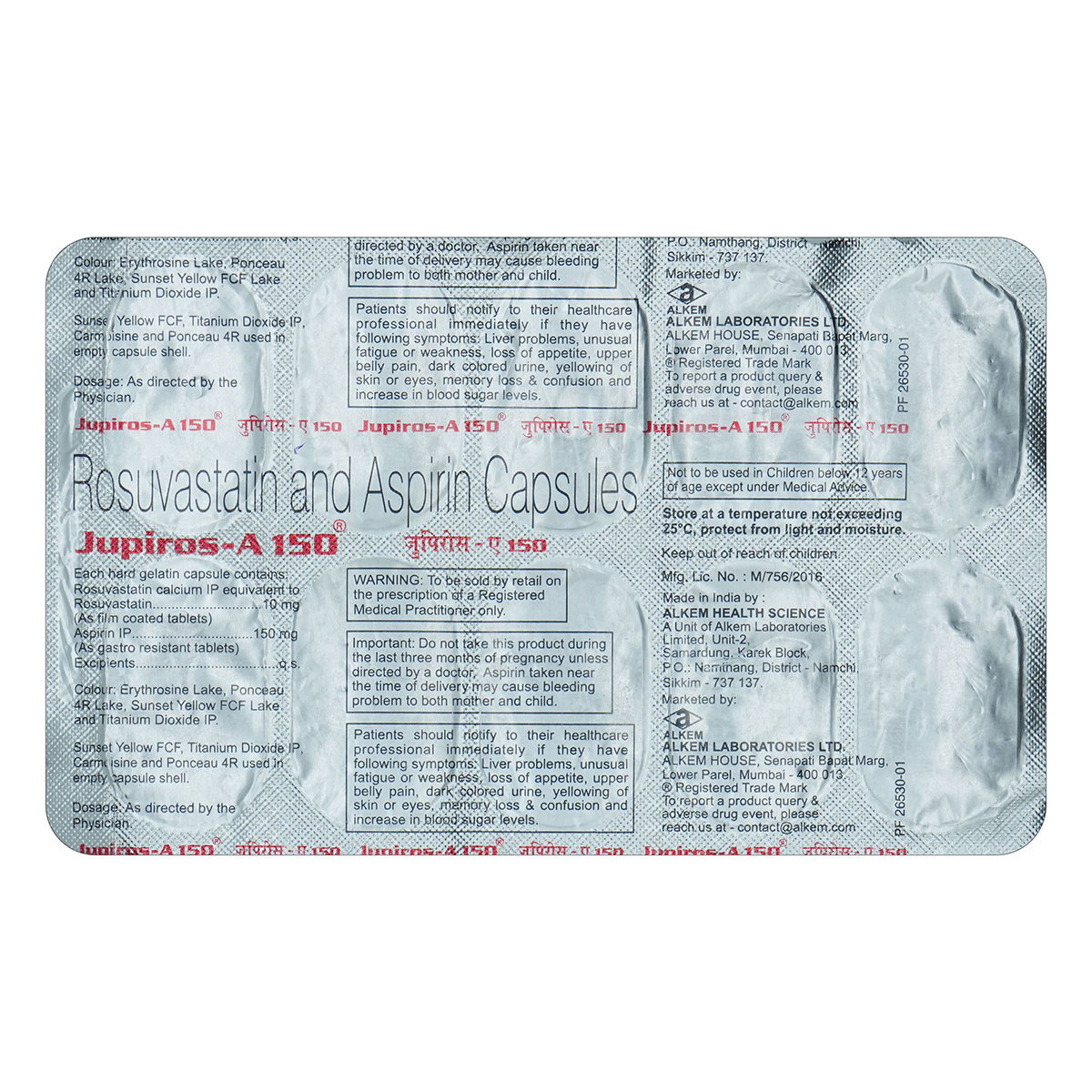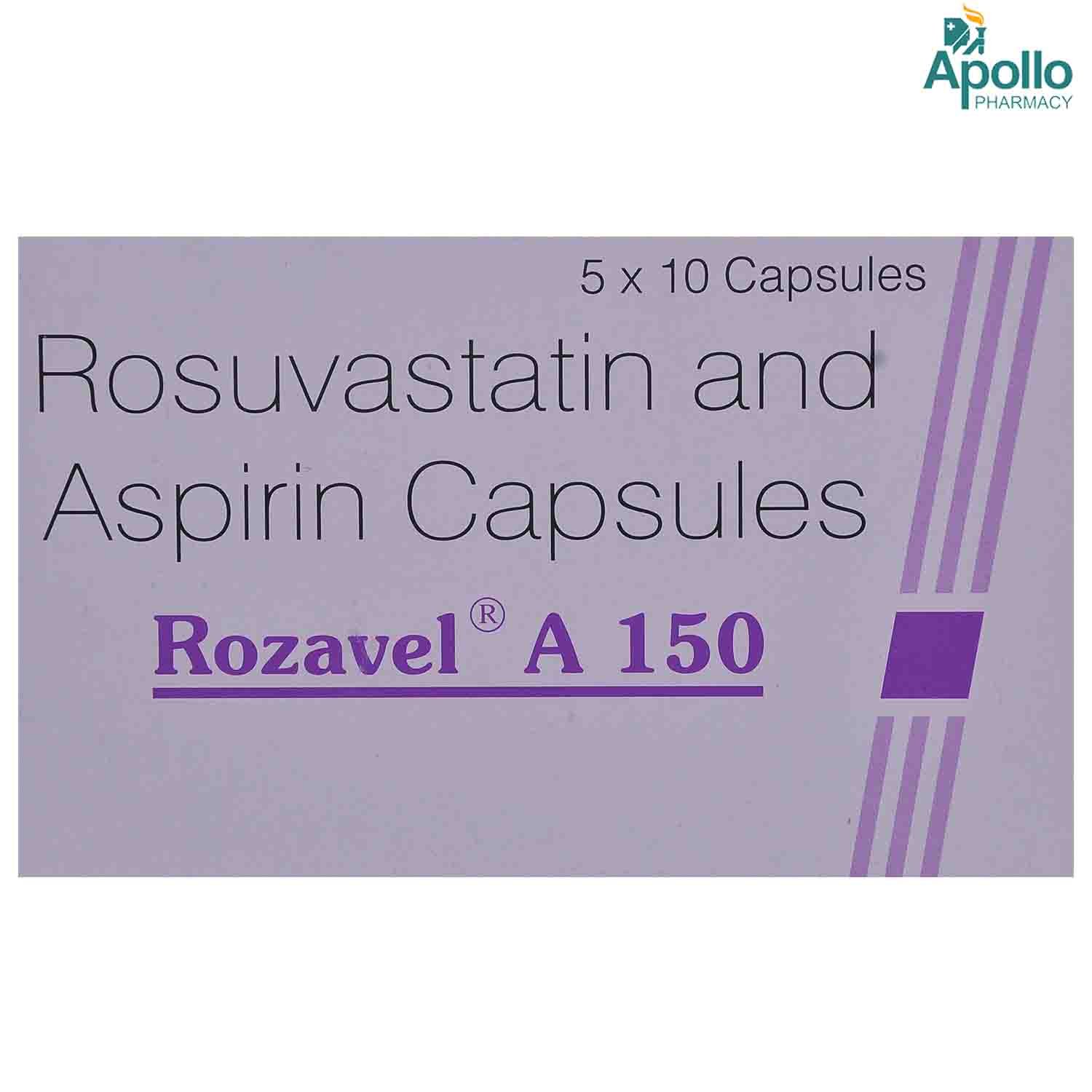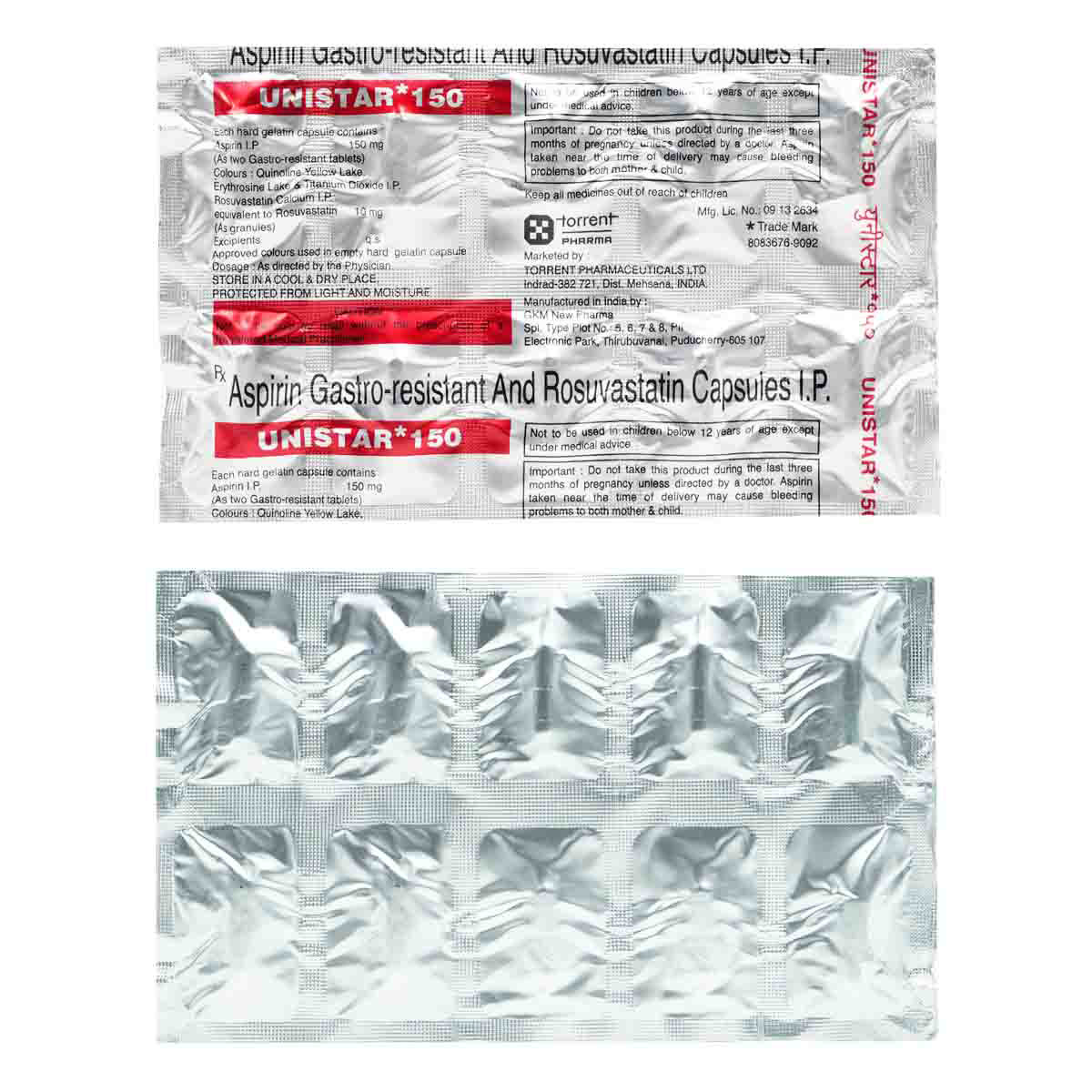Cardirose ASP 10/150 Capsule 10's
MRP ₹52.5
(Inclusive of all Taxes)
₹7.9 Cashback (15%)
Provide Delivery Location
Online payment accepted
 Prescription drug
Prescription drugWhats That
Composition :
Manufacturer/Marketer :
Consume Type :
Expires on or after :
Return Policy :
About Cardirose ASP 10/150 Capsule
Cardirose ASP 10/150 Capsule is a combination of blood-thinning agent and cholesterol-lowering agent, primarily used to prevent myocardial infarction (heart attack), stroke or peripheral vascular disease. It is also used to lower abnormally elevated cholesterol or fat levels (hyperlipidaemia or dyslipidaemia) in the body. A heart attack occurs when a blood clot blocks the blood flow to the heart. This blockage of arteries is often an accumulation of fat, cholesterol and other substances, which form a plaque in the arteries that feed the heart (coronary arteries).
Cardirose ASP 10/150 Capsule is composed of two medicines, namely: Rosuvastatin and Aspirin. Rosuvastatin belongs to the class of antilipemic (cholesterol-lowering) agents. It works by blocking liver enzymes, causing the liver to make less cholesterol. Rosuvastatin lowers the bad cholesterol (low-density lipoprotein or LDL) levels and increases good cholesterol levels (high-density lipoprotein or HDL) in the blood. Aspirin is a non-steroidal anti-inflammatory drug (NSAID) with anti-platelet action. It decreases the formation of blood clots by preventing the platelets from clubbing together. Aspirin acts as a blood-thinning or anti-platelet agent in a low dose (about 75 mg) to prevent heart attack and stroke. Cardirose ASP 10/150 Capsule helps in the free flow of blood, thereby preventing a heart attack, stroke and other peripheral vascular diseases.
Your doctor will advise you how often you take your tablets based on your medical condition. The common side effects of Cardirose ASP 10/150 Capsule include increased bleeding tendency, nausea, abdominal pain, headache, constipation, muscle pain, weakness, dizziness and indigestion. These side effects do not occur in everyone using Cardirose ASP 10/150 Capsule and may vary individually. If these side effects occur, they resolve gradually over time and do not usually require medical attention. However, if you notice any side effects that are not manageable, it is advised to consult your doctor.
Try not to stop taking this medicine of your own. Stopping Cardirose ASP 10/150 Capsule may worsen your condition and increase the risk of a future heart attack. Let your doctor know if you are sensitive to rosuvastatin or aspirin and have any kidney/liver diseases, asthma, active bleeding issues (like peptic ulcer, brain haemorrhage), gastrointestinal disorders, diabetes, mental illnesses (memory loss, forgetfulness, amnesia, memory impairment, confusion), and musculoskeletal disorders before starting Cardirose ASP 10/150 Capsule . If you are pregnant, planning to conceive or breastfeeding, it is essential to seek medical advice before starting Cardirose ASP 10/150 Capsule . The patient should inform the doctor if he/she is taking Cardirose ASP 10/150 Capsule before any surgery is scheduled or any new medicine is taken.
Uses of Cardirose ASP 10/150 Capsule
Directions for Use
Key Benefits
Cardirose ASP 10/150 Capsule is composed of Rosuvastatin and Aspirin. Rosuvastatin is an antilipemic agent (cholesterol-lowering) or HMG-CoA reductase inhibitor. It works by blocking liver enzymes, causing the liver to make less cholesterol. It also lowers the bad cholesterol (low-density lipoprotein or LDL) levels and increases good cholesterol levels (high-density lipoprotein or HDL) in the blood. Rosuvastatin reduces the risk of coronary events, such as heart attack, stroke and angina (chest pain). Aspirin is a non-steroidal anti-inflammatory (NSAID) and anti-platelet drug that decreases blood clot's formation by preventing the platelets from clubbing together. It is also used in heart-related revascularization procedures (provision of new blood supply to a body part), such as coronary artery bypass graft to improve the blood flow through the revascularized area. Cardirose ASP 10/150 Capsule helps in the free flow of blood, thereby preventing a heart attack, stroke and other peripheral vascular diseases.
Storage
Drug Warnings
Before taking Cardirose ASP 10/150 Capsule , let your doctor know if you have a history of liver and kidney diseases or allergic reactions to aspirin and rosuvastatin. If you are at risk of internal bleeding (bleeding inside any tissues, organs or joints of your body), a recent injury/surgery or a planned surgery (including dental) in the next few days, coagulation disorders, such as haemophilia and thrombocytopenia and active bleeding issues (peptic ulcer, brain haemorrhage), please inform your doctor before starting the medicine. If you are pregnant, planning to conceive or breastfeeding, it is essential to seek medical advice before starting Cardirose ASP 10/150 Capsule . Do not drive or operate machinery if you experience dizziness or drowsiness while using Cardirose ASP 10/150 Capsule . Please do not consume alcohol since it may worsen the side effects like dizziness and increased blood pressure. Cardirose ASP 10/150 Capsule is not recommended for children below the age of 16 years.
Diet & Lifestyle Advise
- Take the medication as directed by the doctor and at regular intervals. Do not use other over the counter medications, herbal or vitamin supplements without informing your pharmacist or doctor when you take Cardirose ASP 10/150 Capsule .
- Low cholesterol diet and regular exercise regime are found to complement treatment with Cardirose ASP 10/150 Capsule effectively.
- Keep your cholesterol and triglyceride levels under control.
- Eat at regular intervals and maintain a healthy diet that includes fresh fruits, vegetables.
- The high-fat meal should be avoided as it may further increase the risk of a heart attack instead of eating heart-healthy foods.
- Limit alcohol intake since it raises blood pressure and increases the risk of heart diseases.
- Keep a check on your weight and exercise regularly to keep your heart healthy.
- Your doctor also guides you on noticing and managing the early symptoms of detecting heart diseases.
Side Effects of Cardirose ASP 10/150 Capsule
- Nausea
- Abdominal Pain
- Headache
- Constipation
- Muscle Pain
- Weakness
- Dizziness
- Increased Bleeding Tendency
- Indigestion
Habit Forming
Therapeutic Class
All Substitutes & Brand Comparisons
RX
COTQ 10A Plus Capsule 10's
Trion Pharma India Llp
₹54
(₹4.86 per unit)
2% COSTLIERRX
Out of StockRosumac-Asp 150Mg Cap 10'S
Macleods Pharmaceuticals Ltd
₹62.5
(₹5.63 per unit)
19% COSTLIERRX
Out of StockRosutor-A 10/150 Capsule 15's
Ajanta Pharma Ltd
₹102
(₹6.12 per unit)
29% COSTLIER
Author Details
We provide you with authentic, trustworthy and relevant information
FAQs
Drug-Drug Interactions Checker List
- WARFARIN
- PROBENECID
- METHOTREXATE
- CLOPIDOGREL
- LITHIUM
- SERTRALINE
- CYCLOSPORINE
- TACROLIMUS
- VALPROATE
- PHENYTOIN
- NAPROXEN
- IBUPROFEN
- INSULIN GLARGINE
- LISINOPRIL
- FENOFIBRATE
Special Advise
- Please consult your doctor if Cardirose ASP 10/150 Capsule needs to be discontinued before undergoing a dental procedure or any surgery. The doctor might ask you to stop taking Cardirose ASP 10/150 Capsule a few days before surgery since it can cause an increased risk of bleeding during surgery.
- Monitoring your heart health with occasional ECG will be helpful.
- Please keep a check on your cholesterol levels (HDL, LDL) in blood with timely blood examinations.
Disease/Condition Glossary
A heart attack occurs when a blood clot blocks the blood flow to the heart. This blockage of arteries is often an accumulation of fat, cholesterol and other substances, which form plaque in the arteries that feed the heart (coronary arteries). During a heart attack (myocardial infarction), the blood supply which nourishes the heart with oxygen is cut off. Heart attack signs include chest pain, upper body pain, sweating, nausea, fatigue and trouble breathing.
A stroke occurs when a blockage of blood supply to part of the brain prevents brain tissues from getting enough oxygen and nutrients.
Hyperlipidaemia or dyslipidaemia occurs when there is an excess of the unhealthy balance of cholesterol in the blood. When there is a high cholesterol level in the blood, your arteries get narrowed and clogged, finally contributing to heart diseases like stroke and heart attack. Eating high-fat or high-cholesterol-containing food/drinks and genetic factors are the primary causes of high cholesterol.

Have a query?
Alcohol
Safe if prescribed
It is unsafe to consume alcohol since it may worsen the side effects like dizziness and increase blood pressure.
Pregnancy
Consult your doctor
Cardirose ASP 10/150 Capsule is unsafe to use during pregnancy since it has harmful effects on the foetus. If the patient becomes pregnant while using Cardirose ASP 10/150 Capsule , please discontinue immediately, and you should be aware of the potential risks to the foetus. Please consult your doctor if you are planning to conceive or are already pregnant before starting Cardirose ASP 10/150 Capsule .
Breast Feeding
Consult your doctor
Cardirose ASP 10/150 Capsule is not recommended for use if you are a lactating mother since it may affect the breastfed infant. Please consult your doctor before starting Cardirose ASP 10/150 Capsule .
Driving
Safe if prescribed
Do not drive or operate machinery if you experience dizziness or drowsiness while using Cardirose ASP 10/150 Capsule . Cardirose ASP 10/150 Capsule can also sometimes cause blurry vision, hence avoid driving in such situations. Seek medical attention if the symptoms persist longer.
Liver
Consult your doctor
Let your doctor know if you have any history of liver diseases or hepatic impairment. Your doctor will weigh the benefits and potential risks before prescribing Cardirose ASP 10/150 Capsule .
Kidney
Consult your doctor
Let your doctor know if you have any history of kidney diseases. Your doctor will weigh the benefits and potential risks before prescribing Cardirose ASP 10/150 Capsule .
Children
Safe if prescribed
Cardirose ASP 10/150 Capsule is not recommended for children below the age of 16 years. The safety and efficacy of Cardirose ASP 10/150 Capsule have not been established in children due to limited testing of this drug on children by competent authorities worldwide.





